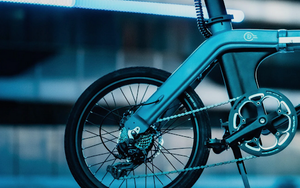Why Are Electric Bikes Legal but Not Scooters?
Apr 05, 2024
List of Contents
- Why are electric bikes legal but not scooters?
- Understanding the difference between electric bikes and scooters
- The legal status of electric bikes
- The legal status of electric scooters
- Reasons behind the legal discrepancies
- The future of electric scooters’ legality
- Conclusion
Why Are Electric Bikes Legal but Not Scooters?
Electric bikes and scooters have become popular modes of transportation, offering eco-friendly and efficient alternatives to traditional vehicles. However, there is a significant discrepancy in their legal status. Electric bikes are widely accepted and regulated, while electric scooters face stricter limitations and even bans in some areas. This article explores the reasons behind this legal discrepancy and examines the potential future of electric scooters' legality.
Understanding the Difference Between Electric Bikes and Scooters
To comprehend the legal disparities, it is crucial to first define electric bikes and electric scooters.
Electric bikes, commonly known as e-bikes, are bicycles equipped with an electric motor to assist pedalling. They come in various configurations, such as pedal-assist (class 1) and throttle-operated (class 2).
On the other hand, electric scooters are two-wheeled vehicles with a small electric motor. They are designed for standing or sitting and usually do not require pedalling.

Defining Electric Bikes
Electric bikes have gained popularity for their ability to provide enhanced mobility while reducing physical exertion. The electric motor assists riders by amplifying their pedalling efforts, making it easier to navigate hills and longer distances. They are often used for commuting, recreational cycling, and even eco-tourism. According to recent data, the global electric bike market is expected to reach a value of $119.72 billion by 2030.
Advantages of Electric Bikes
One of the key advantages of electric bikes is their versatility. They offer riders the option to choose between different levels of assistance, allowing them to tailor their riding experience to their individual preferences and needs. Some electric bikes provide a gentle boost to pedalling, while others offer a more powerful motor that can handle steeper inclines with ease. This flexibility makes electric bikes suitable for a wide range of riders, from those looking for a leisurely ride to those seeking a more intense workout.
Defining Electric Scooters
Electric scooters have seen a surge in popularity, particularly in urban areas, due to their compact design and ease of use. These scooters are typically powered by rechargeable batteries, allowing riders to travel at moderate speeds without the need for physical exertion. They have gained popularity in ride-sharing programs and as a last-mile transportation option. The global electric scooter market is projected to reach $31.04 billion by 2028.
Advantages of Electric Scooters
One of the main advantages of electric scooters is their convenience. With their compact size and lightweight construction, they are easy to manoeuvre through crowded city streets and can be parked in tight spaces. This makes them an ideal choice for commuters who need to navigate busy urban environments. Additionally, electric scooters often have built-in features such as LED lights, horn, and a digital display, enhancing safety and providing riders with essential information about speed and battery life.
Furthermore, electric scooters are environmentally friendly alternatives to traditional gasoline-powered vehicles. By using electric power, they produce zero emissions, reducing air pollution and contributing to a cleaner and greener urban environment. This eco-friendly aspect has made electric scooters a popular choice among environmentally conscious individuals and organisations striving to reduce their carbon footprint.

The Legal Status of Electric Bikes
Electric bikes are generally regarded as bicycles by law and are subject to specific regulations to ensure safety and compatibility with existing infrastructure.
Government Regulations for Electric Bikes
In the UK electric bikes are known as electrically assisted pedal cycles (EAPCs) and you can ride one if you’re over the age of 14, as long as it meets certain requirements. Users do not need a licence and the bike also doesn’t need to be registered, taxed or insured.
If a bike meets the EAPC requirements, it means it is classed as a normal pedal bike and therefore you can ride it on cycle paths and anywhere else pedal bikes are allowed, including some roads. The requirements include:
- Must have pedals
- Must show either the power output or the manufacturer of motor
- Must show the battery voltage or the maximum speed of the bike
- The electric motor must have a max. Power output of 250 watts and should not be able to propel the bike when it’s travelling more than 15.5mph.
If the bike doesn’t meet the above requirements then it is classes as a motorcycle or moped and therefore needs a driving licence, must be taxed and registered and the a crash helmet must be worn.
It is essential for individuals to familiarise themselves with the specific laws in their area to ensure compliance.
The Legal Status of Electric Scooters
Unlike electric bikes, electric scooters face a more complex legal landscape.
UK Law on Electric Scooters
In the UK, privately owned electric scooters cannot be used on public roads or in spaces that are set aside for use by pedestrians, cyclists and horse-riders which include cycle lanes and pavements. It is against the law to do so and anyone caught breaching it is committing a criminal offence.
However, it is legal to use a private electric scooter on private land with the permission of the land owner. The Ducati Scrambler Cross-E makes for a great off-road electric scooter if you have access to private land!

Reasons Behind the Legal Discrepancies
Safety Concerns
One of the primary reasons for the legal discrepancies between electric bikes and electric scooters is safety. Electric scooters are often perceived as more dangerous due to their higher speeds and lack of robust safety features. Reports of accidents, injuries, and even fatalities involving electric scooters have heightened concerns among policymakers. Data shows that e-scooter deaths treble year-on-year.
Infrastructure Challenges
The infrastructure challenges associated with electric scooters also contribute to their legal discrepancies. While electric bikes can operate safely within existing bike lanes and infrastructure, electric scooters require dedicated spaces or modifications to accommodate their unique characteristics. The lack of designated areas for scooters hinders their integration into urban transportation systems.
Regulatory Hurdles
Regulatory hurdles further complicate the legal status of electric scooters. Policymakers are grappling with issues such as liability, insurance requirements, and enforcing regulations on shared electric scooters. Additionally, the rapid rise of electric scooter rental companies has presented challenges in managing their operations and their impact on public spaces.
The Future of Electric Scooters' Legality
Potential Changes in Legislation
Given the increasing popularity and potential benefits of electric scooters, legislative changes to accommodate their use are being considered. Policymakers are exploring ways to address safety concerns and establish clearer regulations that balance the benefits and risks associated with electric scooter usage.
Advocacy for Electric Scooters
Various advocacy groups and organisations are working to promote the acceptance and regulation of electric scooters. They emphasise the positive impact on reducing traffic congestion, air pollution, and improving last-mile transportation options. Their efforts aim to influence policymakers to adopt more lenient regulations that recognise the value of electric scooters.
Impact on the Electric Vehicle Industry
The legal future of electric scooters has broader implications for the electric vehicle industry as a whole. Embracing electric scooters alongside electric bikes could stimulate further innovation in electric transportation and contribute to sustainable urban mobility solutions.

Conclusion
In conclusion, while electric bikes are widely accepted and regulated, electric scooters face stricter limitations and bans in some areas. Safety concerns, infrastructure challenges, and regulatory hurdles contribute to this legal discrepancy. As policymakers continue to grapple with finding the right balance, the future of electric scooters' legality remains uncertain. However, with advocacy efforts and potential legislative changes, electric scooters may find a more accommodating legal landscape, enabling them to be a prominent part of the evolving transportation system.






